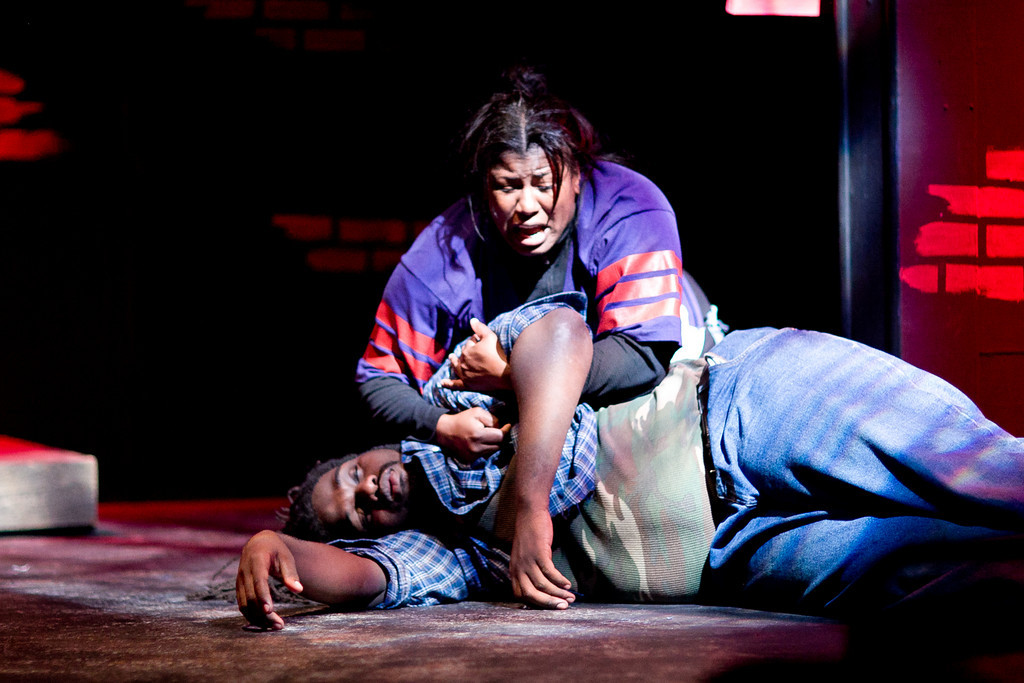IN THE BLOOD, by playwright Suzan-Lori Parks, the first African American woman to win the Pulitzer Prize for drama, is a poignantly portrayed tragedy about Hester La Negrita (portrayed by Tené Fletcher), an impoverished mother of five bastard children by five different fathers.Mother and children, whom she refers to as her “treasures”, live in hunger under a bridge in an “every-city”.

Tené Fletcher and Johnny Walker in a scene from Allens Lane Theater production of IN THE BLOOD, playing in Philadelphia through December 4.
Although this uneducated mother of five endeavors to care for and raise her treasures, she cannot seem to “get a leg up” and speaks of “the big hand [of Fate] coming down on me”. Hester is a person who has an aptitude for giving, however, those who ask from and receive of her, also look down upon her. She is labeled a slut. As the show opens up in hues of red and black, this label is clearly seen. The stage is thus set by Director Jerrell Henderson, for the audience to sit back and witness how Fate may unfold.
The story of Hester is fleshed out in part by other characters in the play who give spotlighted discourses to reveal their views and feelings about her, and themselves.
Hester’s friend Amiga (Miga) Gringa (Sarah P. Robinson) says of her ” [A] woman like Hester driving her life all over the road most often chooses to walk the straight and narrow.”. Miga, however, is always on the prowl for opportunity. She has had children, but has managed to profit by her pregnancies by selling the end product. (Sarah P. Robinson also plays Hester’s youngest daughter, Beauty).
The Welfare Woman (Teresa Miller) sports a middle class family; husband, kids, etc., but engages Hester for money in a threesome keep her hold on her husband. Hester does not receive her remuneration. (Teresa Miller also plays Bully, Hester’s 12 year old daughter).
Chilli (Johnny Walker) is Hester’s first love and the father of her oldest child, Jabber. He returns after 13 years with the intention of marrying Hester and legitimizing his son, but after discovering her four other children, leaves her again saying “We was young. Times change…” (Johnny Walker also portrays Jabber).
The Doctor (Jerrell Henderson), a sort of huckster of health, has taken from Hester’s cache of humanity, and feels sympathy for her, but only performs minimal check-ups on Hester to keep the “authorities” contented. “What can one do?” he says. (Jerrell Henderson also plays Hester’s middle son, Trouble).
The Reverend D. (Richard Bradford) took advantage of Hester’s vulnerability when she came to him asking for help with her four children. He states “Suffering is an enormous turn on… She had a look in her eyes that invites liaisons…”. He helped her on her way to a fifth child. Richard Bradford also plays Baby, Hester’s youngest child).
The use of lights, crates and soapboxes, and center center stage help to frame the above disclosures. The set layers and levels through the use of strategic exits and entrances. Movement and music are well coordinated under appropriate lighting (Director Jerrell Henderson and Assistant Director and Stage Manager, Stephanie Rolland).
Sarah P. Robinson is convincing in her role as Amiga. Teresa Miller does an outstanding turn around as she switches from Welfare Woman, over to Bully. Both performances are powerful. Richard Bradford’s portrayal of the Reverend is provoking, and yet, as Baby he invokes pity.
Jerrell Henderson gives the Doctor a bit of comic/tragic character. The Doctor makes us laugh, but Henderson manages to also imbue the character with a sense of sadness. Johnny Walker fills the stage as Chilli, sweeping the audience up with him. As Jabber he reaches the heart as he teaches his mother how to make letters, protects her from the “bad” word on the wall, and tries in his slow way to make sense of the world. Tene’ Fletcher rocks as Hester. Hester shakes loose the foundations of a notion of safety. She is raw, uneducated and prey to those who would take advantage of someone in her situation, yet she is still giving. She is strong and weak, blind and perceptive, ignorant and wise all in one. Fletcher gives Hester this depth.
There is a scene where Welfare Woman visits Hester at her home under the bridge, which contains perhaps the most enigmatic dialogue of the play:
Hester – “My life’s my own fault. I know that. But the world don’t help, Ma’am”
Welfare Woman – “The world’s not here to help us. The world is simply here. We must help ourselves.”
The audience must decide which character’s viewpoint rings true for them. Fate or Destiny?
IN THE BLOOD
by Suzan-Lori Parks
Directed by Jerrell Henderson
November 19 – December 4, 2010
Allens Lane Theater
601 Allens Lane
(Allens Lane and McCallum Street)
Philadelphia, PA 19119
215-248-0546
www.allenslane.org



1 comment
Lisa Panzer has quite a resume. She is very attractive and talented. I see her moving forward in a big way.
AJC